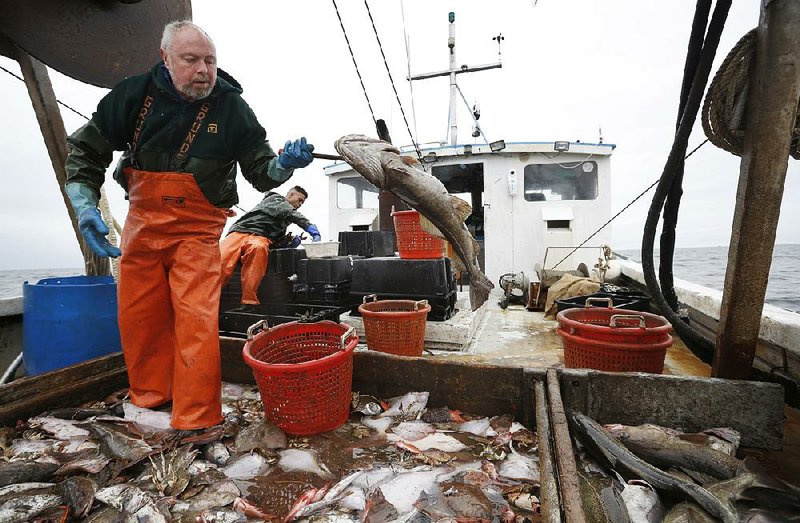SEABROOK, N.H. -- The cod isn't just a fish to David Goethel. It's his identity, his ticket to middle-class life, his link to a historic industry.
"I paid for my education, my wife's education, my house, my kids' education; my slice of America was paid for on cod," said Goethel, a 30-year veteran of these waters that once teemed with New England's signature fish.
But on this chilly, windy Saturday in April, after 12 hours out in the Gulf of Maine, he has caught exactly two cod, and he feels far removed from the 1990s, when he could catch 2,000 pounds in a day.
His boat, the Ellen Diane, a 44-foot fishing trawler named for his wife, is the only vessel pulling into the Yankee Fishermen's Co-op in Seabrook. Fifteen years ago, there might have been a half-dozen. He is carrying crates of silver hake, skates and flounder -- all worth less than cod.
One of America's oldest commercial industries, fishing along the coast of the Northeast still employs hundreds. But every month that goes by, those numbers fall. After centuries of weathering overfishing, pollution, foreign competition and increasing government regulation, the latest challenge is the one that's doing them in: climate change.
Though no waters are immune to the ravages of climate change, the Gulf of Maine, a dent in the coastline from Cape Cod to Nova Scotia, best illustrates the problem. The gulf, where fishermen have for centuries sought lobster, cod and other species that thrived in its cold waters, is now warming faster than 99 percent of the world's oceans, scientists have said.
The warming waters, in the gulf and elsewhere, have caused other valuable species to migrate to deeper or more northern waters. Lobsters have largely abandoned the waters off the southern New England states of Connecticut and Rhode Island, having become more susceptible to disease or predators.
Lobster catches in Maine are booming as the species creeps northward, but if the warming continues, that's likely to end. A federal report from 2009 said that half of 36 fish stocks studied in the northwest Atlantic Ocean have been shifting northward over the past 40 years, and that the trend is likely to continue.
Fish aren't the only ones moving on, and not just in the Northeast. The U.S. fishing fleet has dwindled from more than 120,000 vessels in 1996 to about 75,000 today, the Coast Guard said.
For the fishermen of the northeastern United States -- not all of whom accept the scientific consensus on climate change, and many of whom bristle at government regulations stemming from it -- whether to stick with fishing, adapt to the changing ocean or leave the business is a constant worry.
Goethel has spent most of his life fishing for New England cod, and he doesn't want to stop now.
"I could catch the entire quota for the Gulf of Maine in eight days," he said in a bit of bravado he swears is not an exaggeration. "I wouldn't break a sweat doing it."
The challenges climate change have brought to commercial fishing are perhaps most noticeable in New England's cod fishery, which has dwindled from more than 1,200 boats in the 1980s to only a few dozen today. In that time, the catch of cod has also plummeted, from more than 117 million pounds in 1980 to just over 5 million in 2014.
Most consumers haven't noticed the collapse, with cod still readily available at restaurants and markets because of foreign sources such as Iceland and Norway.
Scientists said late last year that the impact of climate change on Atlantic cod might be worse than previously thought. Fishermen pursue the fish in the Gulf of Maine and, farther off New England, the shallows of Georges Bank, both of which have experienced dramatic temperature rise. Around 2004, the gulf began warming about 10 times faster than previously.
"This is what global warming looks like in the Gulf of Maine," said Andrew Pershing, a Maine-based marine scientist who co-wrote the paper last year in the journal Science.
Goethel, also a marine scientist and a former member of a regional regulatory board, doesn't bemoan the ocean's changing temperature as much as the rules he must play by. Because of the tight quotas, he must avoid fishing around areas where cod live, he said. That is because cod are a "choke species," and when fishermen reach their quota for cod they aren't allowed to pursue other fish.
He doesn't dispute the scientific consensus about climate change, but he does think government regulators apply that science in a manner unnecessarily punitive to fishermen. He has plastered a sticker on his boat declaring, "Who says there's no fish?"
For the most recent fishing year, he was allotted 3,600 pounds of cod. He caught his allotment of 60,000 pounds in 2010, and leased and caught an additional 50,000. He believes that the cod have moved and not died off, and that he could easily continue catching high totals without strict regulations.
Scientists have said warming waters have indeed motivated some young cod to seek deeper, colder waters -- some of which are closed to fishing.
The cuts to catch limits represented the first and biggest blow to the industry, and they stemmed from overfishing and subsequent regulations designed to stop fishermen from taking too much from the sea. They were meant to preserve the fishery for future generations, and it made earning a living difficult.
Climate change has only exacerbated that trouble.
Other obstacles, such as the government-imposed cost of on-board monitors to collect data to inform future fishing quotas, have rankled Goethel. But he perseveres.
"The future of the cod fishery is not that it's in jeopardy," Goethel said. "It needs to be recalibrated."
Business on 06/28/2016

